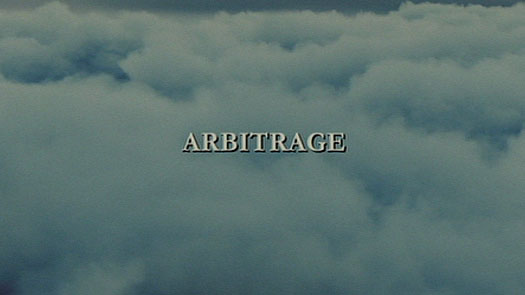
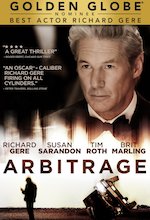 BUY FROM AMAZON: CLICK HERE!
BUY FROM AMAZON: CLICK HERE!
MSRP $14.98
RATED R
STUDIO Lionsgate
RUNNING TIME 107 Minutes
SPECIAL FEATURES
• Director Commentary
• Deleted Scenes with Commentary
• Featurette: A Glimpse into Arbitrage
• Featurette: Who Is Robert Miller?
The Pitch
An interesting scumbag tells lies on Wall Street, and the results are surprising.
The Humans
Richard Gere, Susan Sarandon, Tim Roth, Brit Marling, Nate Parker, Nicholas Jarecki
The Nutshell
Robert Miller (Gere) is a New York hedge-fund magnate who appears to have it all— money, power, a loving wife (Susan Sarandon), and a devoted daughter (Brit Marling) working by his side. But behind the gilded walls of his mansion Miller is running on borrowed time, trying to unload his crippled trading company before his frauds are revealed. A deadly error throws Miller’s “perfect life” into a tailspin, raising the suspicions of a detective (Tim Roth) and threatening the future of his financial empire.

“Next time you hand me a Quentin Tarantino script, make sure you’ve given it to the whole internet first.”
The Lowdown
There’s a certain kind of trust between a viewer and a filmmaker when the film in question takes place in a reality for which the viewer has no reference. Pure fantasy, on the other hand, is easy. As a storyteller, you get to make the rules up. You define the limitations of the world, and you can get away with a lot of weird shit. If you tell a viewer in the first five minutes of your film that the moon is made of cheese, then the viewer knows to throw the rules away. Suspension of disbelief comes more easily.
That trust is more difficult to obtain when setting your story in an environment that is an approximation of the real world. Wall Street, for instance. More specifically, the offices of a hedge fund magnate. Businesses like the ones in Arbitrage exist in the real world, and there are people out there who have accurate expectations of how such a business would function.
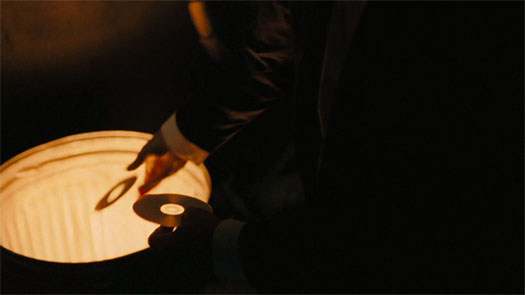
The last two copies of The Oogieloves in The Big Balloon Adventure meet their fiery demise.
Imagine you’re a doctor, and you’re watching a TV show set in a hospital. Or maybe you’re a cop, and you’re watching a police procedural. You will have a more difficult time suspending disbelief in the narrative, because whenever you see something that doesn’t work like it does in the real world, you’re pulled out. The magic isn’t there any more. You are reminded that what you’ve been trying to enjoy is fake. You know that somebody either didn’t do their research, or decided to fudge the rules.
We’ve all had this experience before, but with Arbitrage, I was out of my element. I have no expectation of how a Wall Street hedge fund multimillionaire would live his life. I have no idea how the offices of his investment firm would run. I have no idea if you could pull the wool over the eyes of so many people simply by typing some wrong numbers in an Excel spreadsheet. I barely even know how to manage my own meager income, so naturally, I have no clue if Arbitrage accurately portrays the world in which it takes place. I simply have to trust that writer/director Nicholas Jarecki is telling me some kind of truth. Luckily, Jarecki grew up around Wall Street types (his parents were traders), so his upbringing most likely brings some intangible authenticity.
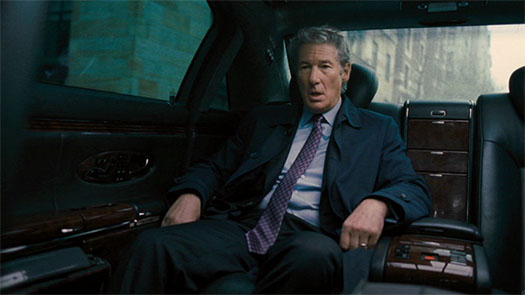
Just then, Richard felt the three pot brownies kick in.
One of the universal truths of film is that your audience will more likely enjoy the film if they understand what the hell is going on. Plot points need to be articulated in a way that a dummy like me can understand why Richard Gere is suddenly screaming at someone across an expensive-looking solid wood desk. Luckily, Arbitrage is a very well made and well written film. It’s slick and accessible, but shows a remarkable amount of class. It’s Nicholas Jarecki’s first feature, but you would never guess it. It’s beautifully shot, tightly edited, and carried by a solid, Golden-Globe-nominated performance from Gere.
Gere plays Robert Miller, a Don Draper type, a well-respected man in his field, emotionally distant from his familiy, with a young mistress on the side. He shows signs of humility, like not wanting to see himself of the cover of Forbes magazine, but he is, in fact, a narcissist. Not born into money, his rags-to-riches life has allowed him to leave the rest of the world below. He can’t even pick out gifts for his own grandkids. He doesn’t know what an Applebee’s is. When attempting to bribe another character, that character asks, “You think money is gonna fix this?” He stares back, asking “What else is there?” He’s a fascinating son of a bitch, and I guarantee you won’t like him.
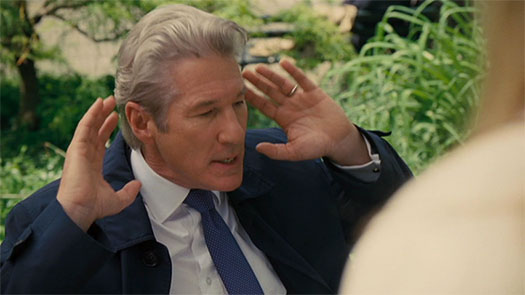
Stage one.
Liking him isn’t the point, though. He’s so well-drawn that you just can’t help but empathize with him on a very basic level. You’ll be more inclined to like the peripheral characters, such as his daughter (played by Brit Marling), his wife (Susan Sarandon), or the son of a deceased friend (a fantastic Nate Parker). The usually warm Brit Marling seems a tad detached in her performance, and Sarandon is underused, but Nate Parker is flat-out great in his role as the accomplice to one of Miller’s crimes.
Tim Roth also plays a substantial role in the film as Detective Bryer, a smart cop with a chip on his shoulder and a distaste for the rich. Roth’s New York accent gets a workout in the film, and it’s not half bad. Bryer and his cop buddies are a step ahead, which prevents the procedural aspect of the film from getting stale, but it still pales in comparison to the central drama with Miller. There is a sort of mirroring and convergence of the Miller and Bryer arcs, which helps to tie the end of the film together, thematically.

Stage two.
Speaking of themes, the moral lessons of the film are very simple, and leave the audience with no uncertainty as to who gets punished and why. It’s perhaps a bit over-simple, compared to something like The Wolf of Wall Street, which can be interpreted as morally vague (or complex) and contradictory (at least on the surface). The lesson of Arbitrage is that faking it will ultimately cause you to fail, but we all know that’s not necessarily true, especially on Wall Street.
The only other thing that really hurts the film is a shaky plot point involving a very shoddy Photoshop job. The reveal is pretty silly, and I actually chuckled aloud when Gere’s character quietly exclaims “Pixels!” when he sees it. “No shit, Richard” I said in return.

Stage three. Golden Globe nomination acquired.
Despite these blemishes, the film is beautifully shot, well acted, and directed with a surprisingly strong hand (for a director’s first feature). Arbitrage performed well at the box office, making over $51 million, with $14 million of that from VOD alone. On a 12 million dollar budget, that’s really impressive. Considering how well Arbitrage turned out and how much money it made, I suspect we’ll be seeing something new from Jarecki very soon.
In the opening scene of the film, Miller says something that acts as a thesis statement for Arbitrage: “Competition for this limited amount of dollars out there can make the best of us manic.” It’s the truest thing said in the whole flick, and unlike the film’s ultimate lesson about faking your way to the top, I believe it applies in the real world. It’s in moments like this one that the truth of Arbitrage is glimpsed, and that allows the vital trust between filmmaker and viewer to remain intact.
The Package
While the DVD presentation of the film isn’t exceptional, it’s certainly more than adequate. The film was shot on 35mm, but the transfer removed a lot of the character of the celluloid. It looked like it could have been shot on a digital HD camera like the Arri Alexa. There’s nothing wrong with shooting on the Alexa, but if you really want to see the texture of 35mm film you should watch the Blu-Ray. The film’s colors are beautiful, and are consistent throughout the transfer. The black levels are nice, but could be a bit darker.
The disc’s audio track is a 5.1 Dolby Digital Surround track, and it sounds clean, with Cliff Martinez’s beautiful score shining through. Dialogue is never muddy, and there’s some good ambience in the mix.
The disc’s featurettes leave a little to be desired, but they do pack a few interesting facts about the cast and crew. Jarecki’s commentary is a must-listen for fans of the film, but he spends a lot of time explaining the plot. His commentary is also available for the deleted scenes.
Rating: 




Out of a Possible 5 Stars